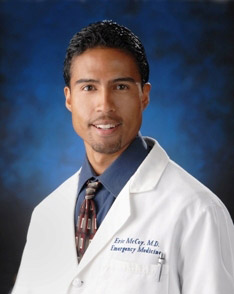 |
Overview:
Simulation encompasses any technology or process that re-creates a contextual background that allows a learner to experience success, mistakes, receive feedback, and gain confidence in a safe environment.1 This may be particularly useful for low-frequency but high-acuity scenarios. Simulation tools include, but are not limited to: computers, virtual reality equipment, procedural task trainers, standardized patients, and high-fidelity mannequins.
The Institute of Medicine, the Educational Technology Section of the 2004 Academic Emergency Medicine Consensus Conference, and the public have advocated for increased simulation based training in an effort to reduce error.2-6 The Association of American Medical Colleges states that simulation is arguably the most prominent innovation in medical education over the past 15 years. Events such as the creation of an academic society dedicated to simulation, the inauguration of a simulation journal, Agency for Healthcare Research and Quality grant awards totaling $5 million, and the proliferation of simulation-based literature and research have all heralded the promise of simulation as a keystone of health profession education and patient safety.7 Simulation has the potential to revolutionize health care education, health care delivery, quality improvement initiatives, and address patient safety issues if appropriately utilized and integrated into the educational and organizational improvement process.
The UC Irvine Emergency Medicine Simulation Fellowship is a one year mentored fellowship that offers advanced training in simulation teaching, curriculum design, educational program implementation, study design, and research for a graduate of an accredited Emergency Medicine residency program. A two-year track is available for those applicants in pursuit of an advanced degree. The simulation fellowship is not an ACGME accredited fellowship as there are no ACGME accredited fellowships in Medical Simulation.
The fellow will have the opportunity to educate/train and form cooperative collaborative relationships with medical students, residents, nurses, allied health professionals, EMTs, paramedics, and physicians while developing and delivering innovative simulation curriculum. The UC Irvine Medical Education Simulation Center is a new $40 million, 65,000-square-foot facility that provides telemedicine and simulation-based educational programs and CME courses for thousands of healthcare providers each year. The four-story simulation center includes a full-scale operating room, emergency room, trauma bay, obstetrics suite and critical care unit (see video).
Fellows will have the opportunity to create and implement new and innovative simulation material and curriculum that will be integrated into the core curriculum of the Department of Emergency Medicine Residency Program as well as the simulation component of the required 4th year Emergency Medicine clerkship rotation. The fellow will have the opportunity to contribute to the simulation curriculum library and educational material that has been delivered by the Department of Emergency Medicine for almost a decade.
Fellows will also participate in medical student, residency, and departmental activities that will improve their academic, teaching, and presenting skills. Lectures by fellows will primarily be during grand rounds at the medical center campus or during simulation conference at the School of Medicine campus. There will also be opportunity to provide education to prehospital care providers in the community via workshops, lectures, and educational conferences. Fellows are encouraged to attend the Society for Simulation in Healthcare annual international meeting.
The Simulation fellow has protected time to design, create, and execute a research agenda that is compatible with individual interest. The Director of the Simulation Fellowship, C. Eric McCoy, MD, MPH has years of experience in education, teaching, undergraduate, medical student, and resident curriculum design, simulation research, and educational program implementation. The simulation fellow will have close mentorship to develop their fund of knowledge and skills in simulation teaching, curriculum design, educational program implementation, study design, and research. There is an expectation that the fellow will have a publishable manuscript by the completion of the fellowship.
- Gaba DM. The future vision of simulation in healthcare. Qual Saf Health Care 2004;13(suppl):i2-10.
- Kohn LT, Corrigan JM, Donaldson MS. To err is human: building a safer health system. Washington, DC: National Academy Press; 2000.
- Kohn LT, Corrigan JM, Donaldson MS. Crossing the quality chasm; a new health system for the 21st century. Washington DC: National Academy Press; 2001.
- Carroll JD, Messenger JC. Medical Simulation: the new tool for training and skill assessment. Perspect Biol Med 2008;51:47-60.
- Vozenilek J, Huff JS, Reznek M, Gordon JA. See one, do one, teach one: advanced technology in medical education. Acad Emerg Med;11:1149-54.
- Bong WF, Lammers RL, Spillane LL, et at. The use of simulation in emergency medicine; a research agenda. Acad Emerg Med 2007;14:353-63.
- Passiment M, Sacks H, Huang G. Medical Simulation in Medical Education: Results of an AAMC Survey. 2011
Application Process:
Graduation from an accredited U.S. Emergency Medicine residency program is required. For further information regarding the fellowship and application process please contact the fellowship Director C. Eric McCoy, MD, MPH.
To apply, please submit the following:
- a letter of intent
- Your CV
- 3 letters of recommendation (submitted electronically)
Thank you for your interest.
 |
C. Eric McCoy, MD, MPH |